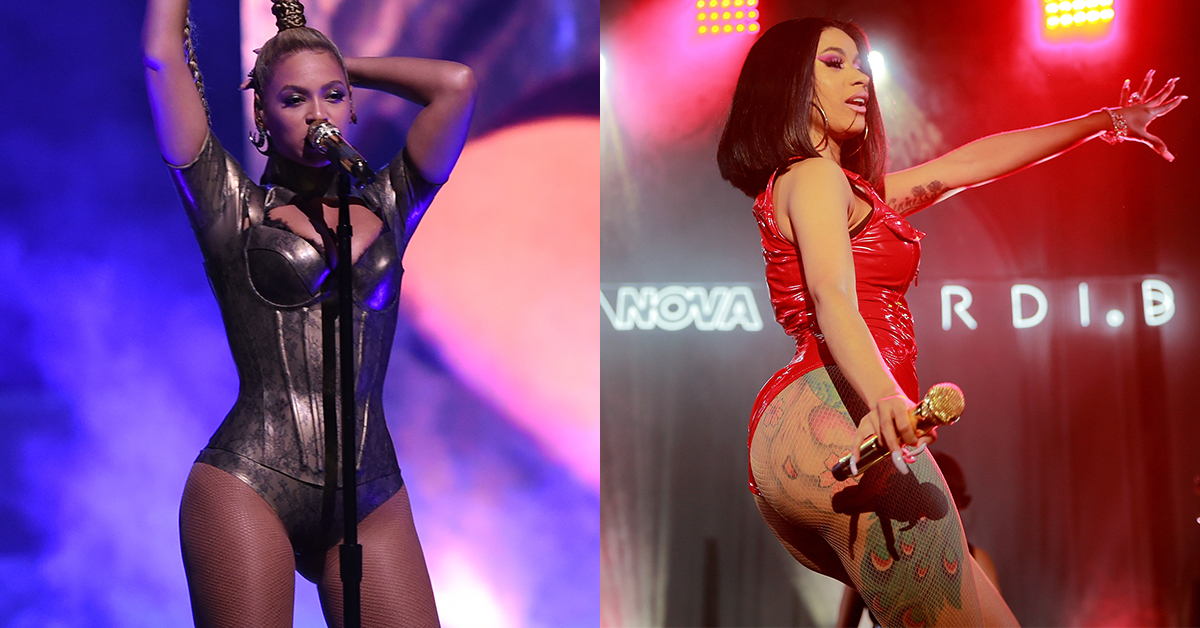I wake up every day hearing the media and internet dissect the words, ideas and actions of men in politics, technology and art, while they critique the appearance of women in entertainment.
When we have true equality either:
1. The most famous woman in the world will be famous for her mind.
2. The most famous man in the world will be running around half naked on a stage, gyrating and singing about his ex, talking 'bout "male power."
Many of the women who celebrate Beyoncé Knowles as a strong, empowered Black woman condemn Kim Kardashian West as a talentless, privileged whore of entitlement. But there are many similarities between these two women.
Beyoncé and Kim are strikingly beautiful and wealthy female entertainers. Both embrace femininity and motherhood while retaining their status as powerful public figures. Some may say that they're both also highly sexualized women.
Kim Kardashian's sexuality is often characterized as a desperate plea for attention by women who say she uses her sexuality to promote herself since she lacks any other talent. On the other hand, Beyonce' can capitalize on her sex appeal and still be celebrated as an icon of female empowerment. Are we saying that since Kim can't sing, she doesn’t count as a feminist?
Cardi B has stated that working as an exotic dancer prior to her rise to fame helped her to, "gain a passion and love to performing." Many of Cardi B's fans view her as a success story because of the odds she overcame in transforming herself from a former stripper to a Grammy award winning entertainer. However, many strippers are still frequently slut-shamed and ridiculed by the public. Cardi B would likely be greeted with contempt by many of her fans if she met them in a nightclub, but she is adored by millions of fans because of her platform.
While we stan and adore highly sexualized women from a distance, in our personal lives we often resent them for the privilege conferred unto them by their looks. Many assertive women are disparaged as arrogant with their confidence and poise reduced to, "she’s stuck up." Why?
Blavitize your inbox! Join our daily newsletter for fresh stories and breaking news.
The most important concept I learned in sociology is a dynamic called “ingroup, outgroup.” Here’s how it works:
1. Create an archetype for a group of humans.
2. Include those who fit the archetype.
3. Exclude those who don’t fit the archetype.
Willie Lynch used this to institute colorism as a feature of the slave trade.
Statistically, the greatest predictor of violence is not anger or rage, it’s contempt or disgust. When members of the "ingroup" realize that everyone hates those in the "outgroup," they develop contempt for the characteristics of the "outgroup" to preserve their social status.
“If I hate what people hate, they will like me.”
Using that concept, you can create systems of oppression that are so deeply embedded in the psyche of the "ingroup" that they will conform to whatever behavioral has been established for the "ingroup," even if that standard is harmful to them.
Human Beings are social animals. Hence, it makes sense that we want to be part of the "ingroup," even if we have to compromise is ourselves. In nature, isolation is a death sentence to a Human. He or she is better off offending himself than his cohorts.
Highly sexualized female entertainers are part of the "ingroup" because of their popularity. However, women who are not entertainers are condemned to the "outgroup" if they are perceived to be sexually provocative. How can sex make one woman a "queen" and another a "slut"? It seems we can't decide if the archetype for an empowered woman is sexually liberal or conservative.
So sis, before you call yourself a "thot" or "wifey material" ask yourself these things:
Who created the female archetype for the "ingroup" of women?
What does the women in the "ingroup" look like and does she represent you?
Or, is it that you’re scared to be part of an obscure and unpopular "outgroup"?
It's OK to love (or worship) Beyoncé, Kim, Nicki, Cardi, Kehlani, SZA, for their breasts, butts, beauty, talent or music, but hating them or loving them is not a substitute for forming an opinion about yourself. Don’t mistake the power and platform they have for a movement for your equality. Move yourselves. Define your own Battles. Write your own anthems and raise your own voice, income level and level of self-awareness.
